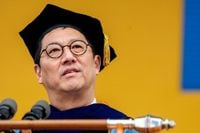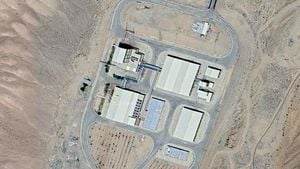The University of Michigan has named Domenico Grasso its interim president, following the announcement by Santa Ono of his departure to assume the presidency at the University of Florida. Grasso, who previously served as chancellor of the university's Dearborn campus, steps into this leadership role amidst growing controversies surrounding Ono's tenure, particularly regarding his handling of diversity, equity, and inclusion (DEI) initiatives.
Santa Ono, who held the presidency at UM for less than three years, announced his decision to leave on May 4, 2025. His departure was officially confirmed as he was chosen as the sole finalist for the presidency at the University of Florida, a position he expects to assume this summer. In the wake of his resignation, Ono's name was notably removed from a public statement signed by various college and university leaders opposing what they termed "unprecedented government overreach" and "political interference" in higher education. This removal came at Ono's request on May 7, according to a spokesperson for the American Association of Colleges and Universities, David Tritelli.
The original statement, dated April 22, expressed concerns about undue government intrusion in educational institutions. It asserted a commitment to serve as centers of open inquiry where faculty, students, and staff can freely exchange ideas without fear of retribution or censorship. Grasso's signature remains on the letter as he continues to serve as chancellor.
Megan Fox, a recent UM graduate, voiced her criticism of Ono's leadership, particularly regarding the DEI cuts initiated during his presidency. "I wasn’t a huge fan of the decisions he made," Fox remarked, adding that many of his decisions seemed hasty and aligned too closely with the current administration's suggestions to avoid losing funding. This sentiment was echoed by fellow graduate Ayisah Anderson, who described Ono's handling of pro-Palestine protests as "super poorly" and criticized the heightened security measures on campus that made students feel unsafe.
Ono's tenure was marked by significant changes, including the closure of centralized DEI offices and a shift in focus towards academic support and merit-based achievement. In a recent op-ed published in Inside Higher Ed, Ono articulated his reasons for leaving UM, stating that he believes in Florida's vision for higher education, which emphasizes academic excellence and intellectual diversity. He expressed concern that DEI initiatives had shifted from their original intent of ensuring equal opportunity to becoming more about ideology and division.
Ono stated, "Like many, I supported what I believed to be the original intent of DEI—ensuring equal opportunity and fairness for every student. But over time, I saw how DEI became something else—more about ideology, division and bureaucracy, not student success. That’s why, as president of the University of Michigan, I made the decision to eliminate centralized DEI offices and redirect resources toward academic support and merit-based achievement." He acknowledged that these decisions were not universally popular but deemed them necessary.
Moreover, Ono emphasized his commitment to fighting antisemitism and ensuring a supportive environment for Jewish students, a stance he intends to maintain at UF. He also promised to uphold a peaceful campus atmosphere, free from disruptive protests, should he be approved as the new president of UF. "If I am approved, UF will remain a campus where all students are safe, where differing views can be heard and where the rule of law is respected," he stated.
Grasso, who will lead UM during the search for a new president, has indicated that he will not apply for the permanent position. His appointment comes at a time when the university is navigating the fallout from Ono's controversial tenure and the increasing scrutiny of higher education governance.
The changes in leadership at the University of Michigan reflect broader tensions within higher education regarding DEI initiatives and the role of universities in addressing political and social issues. As Grasso takes the helm, the university community watches closely to see how he will address these challenges and what direction the institution will take in the future.
In light of these developments, the University of Michigan faces a critical juncture. The incoming leadership will need to balance the diverse needs and opinions of students, faculty, and the wider community while navigating the complex landscape of higher education in a politically charged environment.




